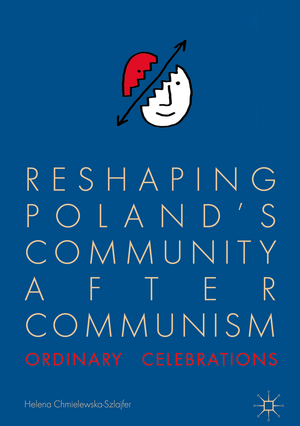Reshaping Poland’s Community after Communism: Ordinary Celebrations
Autor Helena Chmielewska-Szlajferen Limba Engleză Hardback – 5 iul 2018
Reshaping Poland’s Community after Communism focuses on three major cases, largely ignored in Polish scholarship: (1) a hugely popular, faux-baroque Catholic shrine, which illustrates new strategies adopted by the Polish Catholic Church to attract believers; (2) Woodstock Station, a widely known free charity music festival, demonstrating new practices of sympathy towards strangers; and (3) the emergence of national internet pro-voting campaigns and small-town watchdog websites, which uncover changes in practical uses of civic engagement.
In exploring grass-roots, everyday negotiations of religiosity, charity, and civic engagement in contemporary Poland, Chmielewska-Szlajfer demonstrates how a country’s cultural changes can suggest wider, dramatic democratic transformation.
| Toate formatele și edițiile | Preț | Express |
|---|---|---|
| Paperback (1) | 578.05 lei 6-8 săpt. | |
| Springer International Publishing – 15 ian 2019 | 578.05 lei 6-8 săpt. | |
| Hardback (1) | 583.28 lei 6-8 săpt. | |
| Springer International Publishing – 5 iul 2018 | 583.28 lei 6-8 săpt. |
Preț: 583.28 lei
Preț vechi: 686.21 lei
-15% Nou
Puncte Express: 875
Preț estimativ în valută:
111.62€ • 115.83$ • 93.30£
111.62€ • 115.83$ • 93.30£
Carte tipărită la comandă
Livrare economică 17-31 martie
Preluare comenzi: 021 569.72.76
Specificații
ISBN-13: 9783319787343
ISBN-10: 3319787349
Pagini: 191
Ilustrații: XV, 191 p. 15 illus.
Dimensiuni: 148 x 210 x 19 mm
Greutate: 0.4 kg
Ediția:1st ed. 2019
Editura: Springer International Publishing
Colecția Palgrave Macmillan
Locul publicării:Cham, Switzerland
ISBN-10: 3319787349
Pagini: 191
Ilustrații: XV, 191 p. 15 illus.
Dimensiuni: 148 x 210 x 19 mm
Greutate: 0.4 kg
Ediția:1st ed. 2019
Editura: Springer International Publishing
Colecția Palgrave Macmillan
Locul publicării:Cham, Switzerland
Cuprins
1. Introduction.- 2. Licheń Sanctuary: Practicing Aspirations of the Polish Church Community.- 3. Woodstock Station Festival: Practicing Recognition.- 4. National Internet Pro-voting Campaigns and Local Watchdog Websites: Practicing Civil Society Online.- 5. Conclusion: Ordinary Celebrations in a “Pluralistic Situation”.
Notă biografică
Helena Chmielewska-Szlajfer is Assistant Professor at Kozminski University, Poland.
Textul de pe ultima copertă
“The real contribution of the book is to show that the adaptation to new patterns of economy and society in daily life are syncretic, that they meld together elements of tradition and novelty in unpredictable and fascinating ways.”
- Michael Bernhard, Raymond and Miriam Ehrlich Eminent Scholar Chair in Political Science, University of Florida, USA
“Through three carefully executed case studies focused on Poland, demonstrating impressive empirical depth and theoretical sophistication, Chmielewska-Szlajfer helps to fill a lacuna in the field.”
- Jan Kubik, Professor of Slavonic and East European Studies, University College London, UK
“Chmielewska-Szlajfer’s story of an ‘ordinary people’s public sphere’ emerging throughout Poland is a superb and unusually optimistic intervention in contemporary discussions.” - David Ost, Professor of Political Science,Hobart and William Smith Colleges, USA
Harnessing a culturalsociological approach to explore transformations in key social spheres in post-1989 Poland, Chmielewska-Szlajfer illuminates shifts in religiosity, sympathy towards others, and civic activity in post-Communist Poland in the light of the Western influence over elements on Polish life.
Reshaping Poland’s Community after Communism focuses on three major cases, previously largely ignored in Polish scholarship: (1) a hugely popular, new faux-baroque Catholic shrine, which illustrates new strategies adopted by the Polish Catholic Church to attract believers; (2) Woodstock Station, a widely-known free charity music festival, demonstrating new practices of sympathy towards strangers; and (3) the emergence of national internet pro-voting campaigns and small-town watchdog websites, which uncover changes in practical uses of civic engagement.
In exploring grass-roots, everyday negotiations of religiosity, charity, and civic engagement in contemporary Poland, Chmielewska-Szlajfer demonstrates how a country’s cultural changes can suggest wider, dramatic democratic transformation.
- Michael Bernhard, Raymond and Miriam Ehrlich Eminent Scholar Chair in Political Science, University of Florida, USA
“Through three carefully executed case studies focused on Poland, demonstrating impressive empirical depth and theoretical sophistication, Chmielewska-Szlajfer helps to fill a lacuna in the field.”
- Jan Kubik, Professor of Slavonic and East European Studies, University College London, UK
“Chmielewska-Szlajfer’s story of an ‘ordinary people’s public sphere’ emerging throughout Poland is a superb and unusually optimistic intervention in contemporary discussions.” - David Ost, Professor of Political Science,Hobart and William Smith Colleges, USA
Harnessing a culturalsociological approach to explore transformations in key social spheres in post-1989 Poland, Chmielewska-Szlajfer illuminates shifts in religiosity, sympathy towards others, and civic activity in post-Communist Poland in the light of the Western influence over elements on Polish life.
Reshaping Poland’s Community after Communism focuses on three major cases, previously largely ignored in Polish scholarship: (1) a hugely popular, new faux-baroque Catholic shrine, which illustrates new strategies adopted by the Polish Catholic Church to attract believers; (2) Woodstock Station, a widely-known free charity music festival, demonstrating new practices of sympathy towards strangers; and (3) the emergence of national internet pro-voting campaigns and small-town watchdog websites, which uncover changes in practical uses of civic engagement.
In exploring grass-roots, everyday negotiations of religiosity, charity, and civic engagement in contemporary Poland, Chmielewska-Szlajfer demonstrates how a country’s cultural changes can suggest wider, dramatic democratic transformation.
Caracteristici
Offers insights into the democratic transformation of Poland through examinations of the day-to-day lives of "ordinary people" Contextualizes Polish examples with ‘Western’ cases to analyze the influence of the West on Polish cultural development since 1989 Holds value for scholars working in a range of disciplines including cultural sociology, political sociology, political science, social anthropology, transformation studies, religion, and culture and media studies, among other areas
